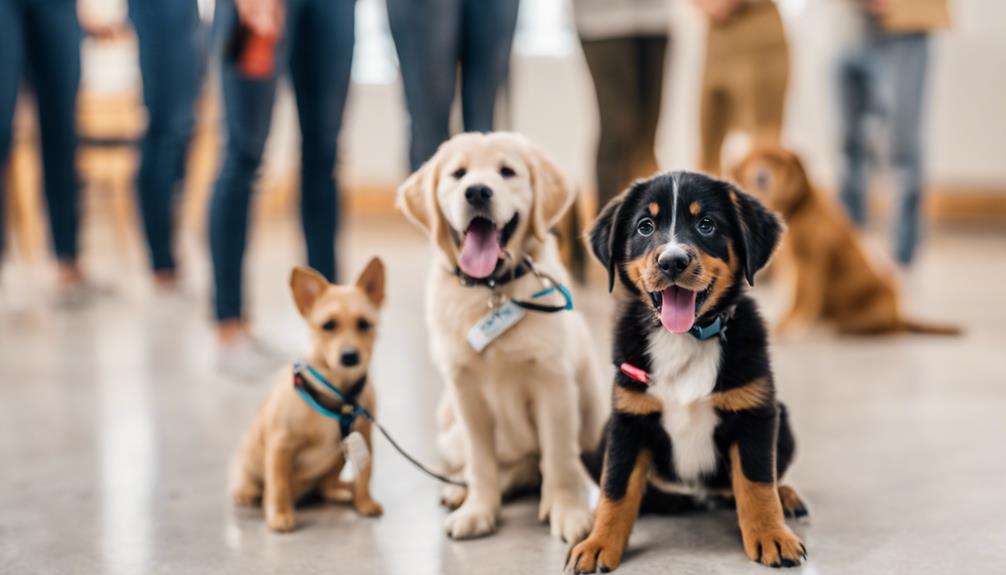Why Choose Puppy Obedience Training Classes?
Thinking about letting your puppy run wild and rule the house? Maybe a future champion in the world of doggie chaos? Well, before you throw in the leash, have you considered the benefits of puppy obedience training classes?
Imagine a harmonious household where your furry friend listens, behaves, and brings joy to your family life.
But what if there's more to it than just good behavior?
Benefits of Puppy Obedience Classes
Enrolling your puppy in obedience classes can greatly enhance their socialization skills and overall behavior. Through training consistency, you can establish clear communication with your furry friend, building a strong foundation for future learning. These classes not only focus on skill development but also provide a wonderful opportunity for bonding with your puppy. By attending these classes together, you create a special bond based on trust and understanding.
The socialization aspect of obedience classes is crucial for your puppy's development. They'll learn how to interact with other dogs and people in a controlled environment, which can prevent behavior issues in the future. Furthermore, exposing them to different environments and situations during training can help them become more adaptable and confident.
Socialization Opportunities for Puppies
To provide your puppy with essential socialization opportunities, consider exposing them to various environments and interactions during obedience training classes. These classes often offer structured play dates where puppies can interact in a controlled setting, allowing them to practice social skills and learn appropriate behavior. Additionally, some obedience training programs may organize puppy parties, which are fun gatherings where puppies can engage with each other in a supervised environment.
Play dates and puppy parties are excellent opportunities for your puppy to learn how to communicate and interact with other dogs, helping them develop crucial socialization skills. These interactions can also aid in building confidence and reducing fear or anxiety around unfamiliar dogs. By participating in these socialization activities during obedience training classes, your puppy can grow into a well-rounded and sociable companion.
Professional Guidance and Expertise
Consider seeking professional guidance and expertise when enrolling your puppy in obedience training classes to ensure a structured and effective learning experience. Professional trainers bring a wealth of knowledge on training techniques and behavior modification tailored to your puppy's specific needs. Their expert advice can help you navigate the challenges of puppy development, ensuring that your furry friend learns important skills in a positive and encouraging environment.
Professional trainers are equipped with the expertise to address behavioral issues promptly and effectively. They can provide insights into your puppy's behavior, helping you understand the underlying reasons and how to modify them. By working with a professional, you can learn how to communicate effectively with your puppy, reinforcing good behaviors and discouraging undesirable ones.
Their guidance goes beyond just teaching obedience commands; it extends to building a strong foundation for a lifelong bond with your puppy. With their support, you can foster a positive relationship based on trust, respect, and clear communication. Investing in professional guidance sets the stage for a harmonious and fulfilling companionship with your puppy.
Building a Strong Bond With Your Puppy
Seeking professional guidance from experienced trainers enables you to build a strong and lasting bond with your puppy. This bond is essential for a harmonious relationship with your pet. Here's how you can strengthen that connection:
- Bonding activities, interactive play: Engaging in activities such as fetch, hide-and-seek, or agility training can help you and your puppy bond. These interactive play sessions not only provide physical exercise but also create joyful moments that deepen your relationship.
- Trust building, communication skills: Through obedience training classes, you can learn how to establish trust with your puppy. Understanding your pet's body language and vocal cues is crucial for effective communication. This mutual understanding fosters a sense of security and strengthens the bond between you and your furry companion.
- Quality time, consistency: Spending quality time with your puppy and being consistent in your interactions are key to building a strong bond. Regular training sessions, daily walks, and positive reinforcement all contribute to a healthy and trusting relationship with your puppy.
Positive Reinforcement Training Techniques
Strengthen your bond with your puppy by utilizing positive reinforcement training techniques. Reward-based training is a highly effective method that focuses on encouraging desired behaviors through the use of rewards such as treats, toys, or praise. This approach not only teaches your puppy to associate good behavior with positive outcomes but also helps in behavior modification by redirecting unwanted behaviors towards more desirable ones.
Positive reinforcement training works by rewarding your puppy for exhibiting the behaviors you want to encourage. For example, if you're teaching your puppy to sit, you can reward them with a treat when they successfully sit on command. This creates a positive association with the action, making them more likely to repeat it in the future. Similarly, when addressing behavioral issues, such as jumping or excessive barking, positive reinforcement can be used to redirect their focus and reinforce alternative behaviors.
Addressing Behavioral Issues Early
To effectively address behavioral issues early with your puppy, observe their behavior closely and intervene promptly when necessary. Early intervention is key to shaping your puppy's behavior positively. By addressing behavioral issues promptly, you can prevent them from becoming ingrained habits that are harder to change later on.
Here are some essential points to consider:
- Early Intervention: When you notice unwanted behaviors such as excessive barking or chewing, address them immediately. Redirect their behavior towards more appropriate actions through positive reinforcement.
- Behavior Modification: Consistency is crucial in modifying your puppy's behavior. Set clear boundaries and stick to them to help your puppy understand what's expected of them.
- Preventing Problems, Training Foundation: By addressing behavioral issues early on, you're laying a solid training foundation for your puppy. This proactive approach helps prevent future problems and fosters a well-mannered dog.
Creating a Well-Mannered Dog

Start by establishing clear expectations and consistent training routines to shape your puppy into a well-mannered dog. Behavior modification is a key aspect of creating a well-rounded pet. By using positive reinforcement techniques such as treats, praise, and play, you can encourage good behavior and discourage unwanted actions. Consistency is crucial in reinforcing these behaviors, so make sure to set aside time every day for training sessions.
Training techniques like clicker training, where a clicking sound is used to mark correct behavior, can be effective in teaching your puppy obedience and manners. It's essential to be patient and understanding during the training process, as puppies are learning and adapting to their environment. Remember to keep training sessions short and fun to maintain your puppy's interest and engagement.
With dedication and the right approach, you can mold your puppy into a polite and well-behaved companion. By investing time and effort into training and behavior modification, you'll set the foundation for a harmonious relationship with your furry friend.
Long-Term Benefits for Your Family
To ensure a smooth integration of your well-mannered puppy into your family life, consider the long-term benefits this obedience training will bring.
- Family Harmony: Puppy obedience training fosters an environment of peace and cooperation within your household. By instilling good behavior in your furry friend, you're promoting a harmonious atmosphere where everyone can coexist happily.
- Improved Communication: Through training consistency, both you and your puppy learn to understand each other better. This improved communication extends beyond just commands and tricks, enhancing the bond and mutual understanding between your family members and the new addition to the pack.
- Lifelong Skills: The skills acquired through puppy obedience training aren't just for the moment; they're for life. Your puppy will carry these lessons into adulthood, ensuring a well-behaved and socially adept companion for years to come. Invest in training now for a future filled with joy and companionship.
Frequently Asked Questions
Are There Any Age Restrictions for Puppies to Enroll in Obedience Training Classes?
When enrolling your puppy in obedience training classes, age restrictions may apply. Puppies should ideally start classes between 8 to 16 weeks old for optimal socialization and learning.
Different training methods are tailored to specific puppy development stages. These classes help foster good behavior early on, setting a solid foundation for your puppy's future.
It's crucial to check with the training facility for any specific age requirements before enrolling your furry friend.
How Do I Know if My Puppy Is Ready for Obedience Training?
To know if your puppy is ready for obedience training, observe behavior signals like focus, willingness to learn, and ability to follow basic commands. Look for training progress and consistency in behavior.
Socialization skills are essential, so check for how your puppy interacts with other dogs and people. Playful behaviors show readiness for learning.
When these aspects align positively, your puppy is likely ready for obedience training classes.
Can Older Dogs Benefit From Obedience Training Classes as Well?
Older dogs can definitely benefit from obedience training classes. Senior dogs can still learn new tricks and behaviors. Training benefits include mental stimulation, improved communication, and strengthened bonds between you and your furry companion.
Behavioral issues in older dogs can also be addressed through obedience training, helping them become more well-behaved and obedient. Consider enrolling your older dog in obedience classes to provide them with mental and physical exercise while enhancing their overall quality of life.
Are There Any Specific Breeds That May Not Be Suited for Obedience Training Classes?
Certain breeds may present unique challenges in obedience training due to their strong-willed nature or high energy levels. Breeds like Huskies or Terriers may require specialized training approaches.
However, with patience and consistency, most breeds can benefit from obedience classes. If you encounter breed limitations or behavioral challenges, consider seeking alternative training methods or consulting with a professional trainer for special considerations tailored to your dog's specific needs.
How Can I Continue to Reinforce the Training at Home After the Classes Are Completed?
To reinforce training at home after classes, remember to keep up with training consistency. Practice what you learned regularly to help your puppy remember the lessons.
Use positive reinforcement to encourage good behavior and continue behavior modification when needed. Make training a part of your daily routine and always stay patient and consistent.
With dedicated home practice, your puppy will retain what they learned in obedience classes and continue to improve.
Conclusion
So, why choose puppy obedience training classes?
Well, they offer numerous benefits such as socialization opportunities, professional guidance, and positive reinforcement techniques.
By addressing behavioral issues early and creating a well-mannered dog, you're setting your furry friend up for long-term success.
Plus, the strong bond you'll build with your puppy throughout the training process will only strengthen your family dynamic.
Don't hesitate, sign up for a class today and see the difference it can make!
